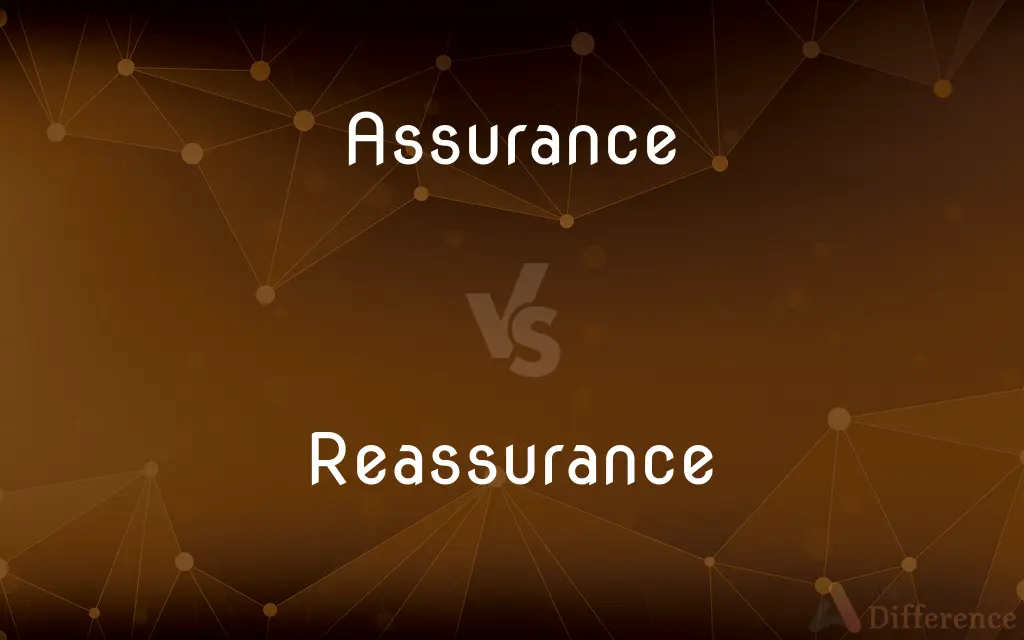Assurance vs. Reassurance — What's the Difference?
By Tayyaba Rehman — Updated on September 25, 2023
Assurance is a positive declaration intended to give confidence, while reassurance is the action of restoring confidence to someone who is distressed or worried.

Difference Between Assurance and Reassurance
Table of Contents
ADVERTISEMENT
Key Differences
Assurance and reassurance both play critical roles in instilling confidence but they operate in different realms of communication and intention. Assurance is generally a promise or guarantee given to someone to dispel doubts or fears, providing confidence that specific conditions or outcomes will be met. It is proactive and given even before doubts and fears emerge, often used to affirm the reliability, quality, or outcome of a process, service, or product.
Reassurance, on the other hand, is reactive, usually given to alleviate existing concerns, fears, or doubts. It is often administered to soothe and comfort someone who is already anxious or distressed, reinforcing a sense of security and alleviating worry. Reassurance often follows a period of uncertainty, providing solace and comfort to the concerned individual or party.
Assurance typically outlines certainty and commitment about future actions or outcomes. It serves as a pledge or vow that aims to foster trust and reliance, and it's commonly used in formal settings such as contracts or agreements. Assurance builds confidence by confirming the probability of an event occurring as stated or a product performing as promised.
Reassurance, conversely, targets existing insecurities and fears, intending to reinstate lost confidence. It acts as a calming and comforting response to someone’s expressed worries or fears, focusing on alleviating the emotional distress associated with uncertainty. Reassurance can be expressed through words, actions, or gestures that convey understanding and empathy.
In essence, while assurance serves as a proactive declaration aimed at preventing doubts and fostering confidence and reliance on a future outcome, reassurance operates as a remedial response to dispel already existing fears and anxieties, restoring lost confidence and providing emotional solace.
ADVERTISEMENT
Comparison Chart
Definition
A positive declaration intended to give confidence.
The action of restoring confidence to someone who is distressed or worried.
Nature
Proactive, provided to prevent doubts and fears.
Reactive, given to alleviate existing concerns.
Objective
To foster trust and reliance by confirming certainty.
To restore lost confidence and provide emotional comfort.
Usage
Commonly used in formal settings like contracts.
Usually expressed in supportive and empathetic scenarios.
Expression
Can be conveyed through promises or guarantees.
Conveyed through comforting words, actions, or gestures.
Compare with Definitions
Assurance
A positive declaration intended to give confidence.
The manager gave his assurance that the project would be completed on time.
Reassurance
The action of removing someone's doubts or fears.
His kind words provided much-needed reassurance to the worried parents.
Assurance
A statement or gesture intended to dispel doubts or fears.
His assurance that the product is reliable convinced us to make the purchase.
Reassurance
Restoration of confidence to someone who is distressed.
The doctor’s reassurance about the prognosis eased the patient’s mind.
Assurance
A binding commitment made to instill confidence.
The agreement provided assurance of mutual cooperation between the companies.
Reassurance
A statement or gesture made to relieve anxiety or distress.
A gentle pat on the back served as reassurance during the tense moment.
Assurance
A formal declaration made to foster trust and reliance.
The spokesperson's assurance was aimed at alleviating public concerns about safety.
Reassurance
Providing comfort and support to someone experiencing doubts.
The child sought reassurance from his parents during the storm.
Assurance
A pledge or guarantee that certain conditions or outcomes will be met.
The warranty provides assurance against defects in manufacturing.
Reassurance
The act of making someone feel less worried or fearful.
Reassurance from the leader calmed the anxious team.
Assurance
A statement or indication that inspires confidence; a guarantee or pledge
Gave her assurance that the plan would succeed.
Reassurance
To restore confidence to
I felt reassured that I was up to the job.
Assurance
Freedom from doubt; certainty about something
Do you have any assurance that the work will be done well?.
Reassurance
To assure again
We reassured him that the project was on schedule.
Assurance
Self-confidence
"I tried imitating the assurance they carried themselves with" (Alec Wilkinson).
Reassurance
To reinsure.
Assurance
Chiefly British Insurance, especially life insurance.
Reassurance
The feeling of being reassured, of having confidence restored, of having apprehensions dispelled.
Assurance
The act of assuring; a declaration tending to inspire full confidence; something designed to give confidence.
Reassurance
The act of confirming someone's opinion or impression.
Assurance
The state of being assured; total confidence or trust; a lack of doubt; certainty.
Reassurance
Reinsurance.
Assurance
Firmness of mind; undoubting steadiness; intrepidity; courage; confidence; self-reliance.
Reassurance
Assurance or confirmation renewed or repeated.
Assurance
Excessive boldness; impudence; audacity
His assurance is intolerable
Reassurance
Same as Reinsurance.
Assurance
(obsolete) Betrothal; affiance.
Reassurance
The act of reassuring; restoring someone's confidence
Assurance
(insurance) Insurance; a contract for the payment of a sum on occasion of a certain event, as loss or death. Assurance is used in relation to life contingencies, and insurance in relation to other contingencies. It is called temporary assurance, in the time within which the contingent event must happen is limited.
Assurance
(legal) Any written or other legal evidence of the conveyance of property; a conveyance; a deed.
Assurance
(theology) Subjective certainty of one's salvation.
Assurance
The act of assuring; a declaration tending to inspire full confidence; that which is designed to give confidence.
Whereof he hath given assurance unto all men, in that he hath raised him from the dead.
Assurances of support came pouring in daily.
Assurance
The state of being assured; firm persuasion; full confidence or trust; freedom from doubt; certainty.
Let us draw with a true heart in full assurance of faith, having our hearts sprinkled from an evil conscience.
Assurance
Firmness of mind; undoubting, steadiness; intrepidity; courage; confidence; self-reliance.
Brave men meet danger with assurance.
Conversation with the world will give them knowledge and assurance.
Assurance
Excess of boldness; impudence; audacity; as, his assurance is intolerable.
Assurance
Betrothal; affiance.
Assurance
Insurance; a contract for the payment of a sum on occasion of a certain event, as loss or death.
Assurance
Any written or other legal evidence of the conveyance of property; a conveyance; a deed.
Assurance
Freedom from doubt; belief in yourself and your abilities;
His assurance in his superiority did not make him popular
After that failure he lost his confidence
She spoke with authority
Assurance
A binding commitment to do or give or refrain from something;
An assurance of help when needed
Signed a pledge never to reveal the secret
Assurance
A statement intended to inspire confidence;
The President's assurances were not respected
Assurance
A British term for some kinds of insurance
Common Curiosities
What is the key difference between assurance and reassurance?
Assurance is a proactive guarantee or pledge given to prevent doubts, while reassurance is a reactive measure to alleviate existing concerns and fears.
Can assurance be considered a form of commitment?
Yes, assurance can be seen as a form of commitment as it provides a guarantee or pledge about certain conditions or outcomes.
Is reassurance typically provided after a concern has been raised?
Yes, reassurance is usually given in response to existing doubts, fears, or concerns to restore confidence and provide comfort.
Can assurance be used in formal agreements?
Yes, assurance is often used in formal settings such as contracts or agreements to foster trust and reliance.
Is reassurance dependent on the receiver's emotional state?
Yes, the effectiveness of reassurance often depends on the individual's emotional state and their perception of the comforting gesture or words provided.
Does reassurance focus more on emotional comfort?
Yes, reassurance primarily aims to provide emotional comfort and alleviate distress by addressing and soothing existing fears or worries.
Is assurance commonly used to confirm the reliability of a product or service?
Yes, assurance is often used to affirm the reliability or quality of a product or service, fostering confidence in its performance.
Can assurance be legally binding?
Depending on the context, assurance, especially in contracts or agreements, can be legally binding, representing a formal commitment.
Does assurance aim to prevent uncertainty and doubt?
Yes, assurance aims to preemptively dispel doubts and uncertainties by providing guarantees or positive declarations.
Can reassurance be non-verbal?
Yes, reassurance can be conveyed through non-verbal means such as gestures or actions that are comforting and supportive.
Share Your Discovery

Previous Comparison
Methanol vs. Menthol
Next Comparison
Source vs. OutletAuthor Spotlight
Written by
Tayyaba RehmanTayyaba Rehman is a distinguished writer, currently serving as a primary contributor to askdifference.com. As a researcher in semantics and etymology, Tayyaba's passion for the complexity of languages and their distinctions has found a perfect home on the platform. Tayyaba delves into the intricacies of language, distinguishing between commonly confused words and phrases, thereby providing clarity for readers worldwide.















































